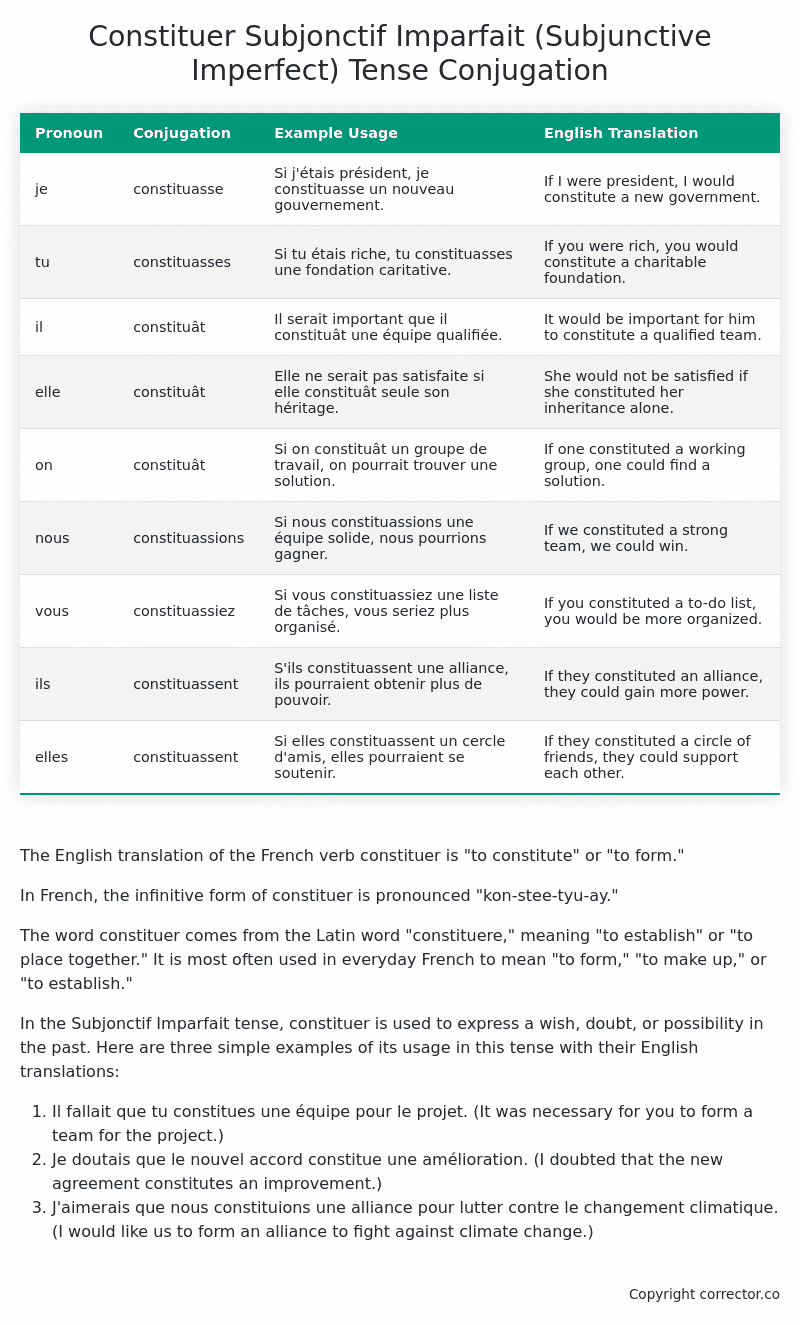Subjonctif Imparfait (Subjunctive Imperfect) Tense Conjugation of the French Verb constituer
Introduction to the verb constituer
The English translation of the French verb constituer is “to constitute” or “to form.”
In French, the infinitive form of constituer is pronounced “kon-stee-tyu-ay.”
The word constituer comes from the Latin word “constituere,” meaning “to establish” or “to place together.” It is most often used in everyday French to mean “to form,” “to make up,” or “to establish.”
In the Subjonctif Imparfait tense, constituer is used to express a wish, doubt, or possibility in the past. Here are three simple examples of its usage in this tense with their English translations:
- Il fallait que tu constitues une équipe pour le projet. (It was necessary for you to form a team for the project.)
- Je doutais que le nouvel accord constitue une amélioration. (I doubted that the new agreement constitutes an improvement.)
- J’aimerais que nous constituions une alliance pour lutter contre le changement climatique. (I would like us to form an alliance to fight against climate change.)
Table of the Subjonctif Imparfait (Subjunctive Imperfect) Tense Conjugation of constituer
| Pronoun | Conjugation | Example Usage | English Translation |
|---|---|---|---|
| je | constituasse | Si j’étais président, je constituasse un nouveau gouvernement. | If I were president, I would constitute a new government. |
| tu | constituasses | Si tu étais riche, tu constituasses une fondation caritative. | If you were rich, you would constitute a charitable foundation. |
| il | constituât | Il serait important que il constituât une équipe qualifiée. | It would be important for him to constitute a qualified team. |
| elle | constituât | Elle ne serait pas satisfaite si elle constituât seule son héritage. | She would not be satisfied if she constituted her inheritance alone. |
| on | constituât | Si on constituât un groupe de travail, on pourrait trouver une solution. | If one constituted a working group, one could find a solution. |
| nous | constituassions | Si nous constituassions une équipe solide, nous pourrions gagner. | If we constituted a strong team, we could win. |
| vous | constituassiez | Si vous constituassiez une liste de tâches, vous seriez plus organisé. | If you constituted a to-do list, you would be more organized. |
| ils | constituassent | S’ils constituassent une alliance, ils pourraient obtenir plus de pouvoir. | If they constituted an alliance, they could gain more power. |
| elles | constituassent | Si elles constituassent un cercle d’amis, elles pourraient se soutenir. | If they constituted a circle of friends, they could support each other. |
Other Conjugations for Constituer.
Le Present (Present Tense) Conjugation of the French Verb constituer
Imparfait (Imperfect) Tense Conjugation of the French Verb constituer
Passé Simple (Simple Past) Tense Conjugation of the French Verb constituer
Passé Composé (Present Perfect) Tense Conjugation of the French Verb constituer
Futur Simple (Simple Future) Tense Conjugation of the French Verb constituer
Futur Proche (Near Future) Tense Conjugation of the French Verb constituer
Plus-que-parfait (Pluperfect) Tense Conjugation of the French Verb constituer
Passé Antérieur (Past Anterior) Tense Conjugation of the French Verb constituer
Futur Antérieur (Future Anterior) Tense Conjugation of the French Verb constituer
Subjonctif Présent (Subjunctive Present) Tense Conjugation of the French Verb constituer
Subjonctif Passé (Subjunctive Past) Tense Conjugation of the French Verb constituer
Subjonctif Imparfait (Subjunctive Imperfect) Tense Conjugation of the French Verb constituer (this article)
Subjonctif Plus-que-parfait (Subjunctive Pluperfect) Tense Conjugation of the French Verb constituer
Conditionnel Présent (Conditional Present) Tense Conjugation of the French Verb constituer
Conditionnel Passé (Conditional Past) Tense Conjugation of the French Verb constituer
L’impératif Présent (Imperative Present) Tense Conjugation of the French Verb constituer
L’infinitif Présent (Infinitive Present) Tense Conjugation of the French Verb constituer
Struggling with French verbs or the language in general? Why not use our free French Grammar Checker – no registration required!
Get a FREE Download Study Sheet of this Conjugation 🔥
Simply right click the image below, click “save image” and get your free reference for the constituer Subjonctif Imparfait tense conjugation!

Constituer – About the French Subjonctif Imparfait (Subjunctive Imperfect) Tense
Formation
Common Everyday Usage Patterns
Interactions with Other Tenses
Subjonctif Présent
Indicatif Passé Composé
Conditional
Conditional Perfect
Summary
I hope you enjoyed this article on the verb constituer. Still in a learning mood? Check out another TOTALLY random French verb conjugation!


